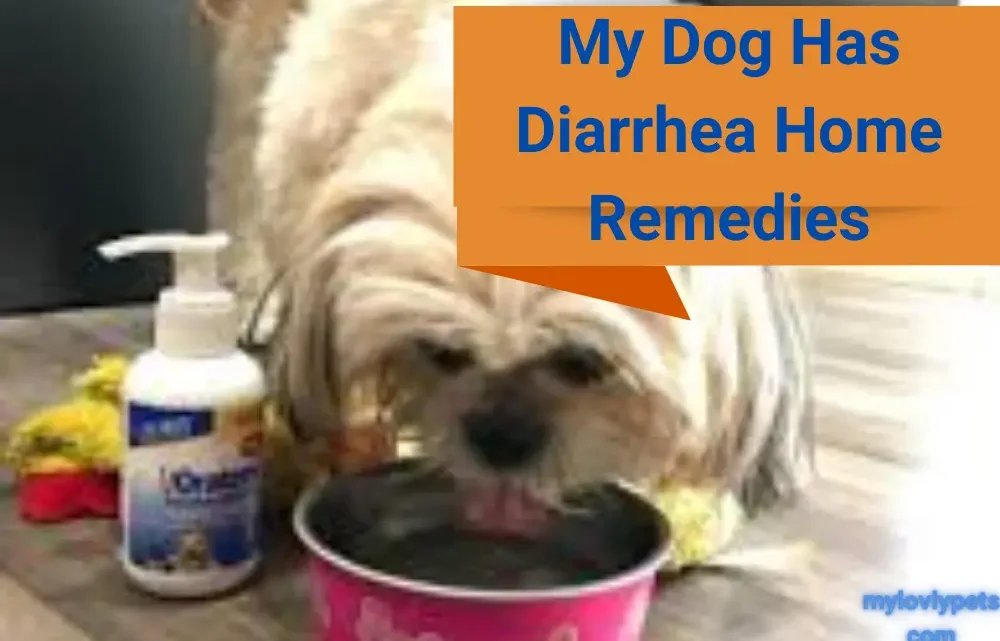
My Dog Has Diarrhea Home Remedies
Welcome to our guide on “My Dog Has Diarrhea Home Remedies.” If you’ve ever faced the messy challenge of a pup with an upset stomach, you know it’s not a pleasant experience. In this blog, we’ll dive into the common types of dog diarrhea, such as small and large intestinal issues, acute bouts, and chronic conditions. We’ll explore why it’s crucial to address diarrhea promptly, delving into the potential causes and symptoms, ensuring your furry friend stays happy and healthy.
Our content covers a range of topics, from the types of diarrhea to additional signs you should watch for in your pet. We’ll discuss the most common causes, including dietary changes, infections, and stress-related issues. Dive deeper into how specific breeds and age groups may be predisposed to diarrhea, and learn when it’s time to seek professional help.
Here we will discuss the ins and outs of canine diarrhea, from the medications recommended by veterinarians to effective home cures, and how to diagnose and treat the condition. We care most about your dog’s health and happiness, and we’re here to help you keep those tails wagging and stomachs full. Let’s go on this journey of learning together!
Types of Diarrhea in Dogs
Small Intestinal Diarrhea
- Causes: This type often happens when your dog eats something they can’t tolerate, like certain foods or a sudden change in their diet. It can also occur due to an overgrowth of bacteria in their small intestine.
Large Intestinal Diarrhea
- Characteristics: This kind of diarrhea is more frequent, and you might notice mucus or even blood in your dog’s stool.
- Causes: It could be related to issues like inflammatory bowel disease or parasites.
Acute Diarrhea
- Duration and Recovery: Acute diarrhea is like a short-term upset in your dog’s stomach. It usually gets better on its own with a bit of care from you.
- When to Seek Vet Attention: But if it lasts more than 48 hours, it’s a sign you should get your furry friend to the vet.
Chronic Diarrhea
- Causes: This type of diarrhea sticks around and might be a sign of something more serious. Possible causes include hyperthyroidism, dysbiosis, parasites, or even cancer.
- Effects on Dogs and Dietary Considerations: If your dog has chronic diarrhea, they could lose weight, have a dull coat, and lack energy. Pay attention to what they eat – some dog foods marketed as ‘healthy’ might be causing the trouble. Your vet can guide you on the right diet.
Additional Signs of Diarrhea in Dogs

When your furry friend is dealing with diarrhea, it’s not just about the runny poop. Dogs can show a range of symptoms that go hand-in-hand with this uncomfortable issue.
1. Loss of Appetite, Nausea, and Vomiting:
- If your dog turns away from their favorite treats or meals, it could be a sign of something more. Loss of appetite often comes with feelings of nausea, and in some cases, your dog might start vomiting. It’s their way of telling you that something isn’t quite right in their stomach.
2. Increased Urgency, Painful Abdomen, Weakness:
- Watch out for changes in your dog’s behavior when they need to go outside. Increased urgency or a higher frequency of bathroom breaks may indicate a larger issue. If your pup is hesitant to move, seems uncomfortable, or displays signs of a painful abdomen, it could be linked to the diarrhea. Weakness and lethargy might follow, indicating that your dog is not feeling their usual energetic self.
3. Indicators of Chronic Diarrhea:
- Chronic diarrhea is more than just a temporary upset stomach. If your dog experiences persistent or recurrent diarrhea, it might be time to raise the alarm. Chronic diarrhea can lead to weight loss, an unhealthy coat, and low energy levels. Keep an eye on the frequency and consistency of the stool. If it’s becoming a recurring problem, it’s crucial to consult with your vet.
Common Causes of Diarrhea in Dogs
Dietary Changes and Inappropriate Foods
Sometimes, our furry friends are just like us – they can’t handle sudden changes in their diet. If they get their paws on human food or if we switch their dog food too quickly, it can lead to a runny situation. So, be mindful of what they eat and introduce new foods gradually.
Parasites, Bacterial, and Viral Infections
Yep, dogs can catch bugs too, and not the kind we want as pets! Parasites like worms, bacterial infections such as Salmonella, or viral infections like parvovirus can upset their stomachs. Regular vet check-ups and preventive treatments can help keep these invaders at bay.
Stress-Related Factors
Believe it or not, our dogs can get stressed out too. Changes in routine, new environments, or even loud noises can cause stress-induced diarrhea. So, keeping their environment calm and consistent is key to a happy tummy.
Other Serious Health Issues:
- Metabolic Problems and Gastrointestinal Diseases: Dogs, like humans, can face metabolic issues or diseases in their stomach and intestines. It’s like their body isn’t processing things the way it should. A vet can help figure out if there’s something more serious going on.
- Less Common Causes: Hemorrhagic Diarrhea, Cancer, Medication-Related: Yeah, it sounds scary, but these are less common scenarios. Hemorrhagic diarrhea (bloody poop), cancer, or reactions to certain medications can cause diarrhea. Always good to keep an eye out for any unusual signs and get expert advice.
Dogs Predisposed to Diarrhea
Puppies and Young Dogs
Puppies, like curious toddlers, often end up exploring the world through their mouths. Whether it’s tasting new things or getting into mischief, their stomachs can be sensitive. Changes in diet, stress, or encounters with unfamiliar substances can trigger diarrhea. It’s part of growing up, and they usually bounce back with a little care.
Senior Dogs
Just as with humans, aging brings its own set of challenges for our furry friends. Senior dogs may face chronic health issues that make them more susceptible to diarrhea. Issues like gastrointestinal problems, kidney concerns, or even just a bit of extra stress can lead to upset stomachs. It’s a reminder to keep an extra eye on our seasoned companions.
Breed-Specific Sensitivities
Greyhounds
Greyhounds, known for their graceful sprints, often come with a delicate digestive system. Even slight changes in diet or a bit of stress can result in loose stools. Despite their sensitive stomachs, we adore them for their speed and elegance.
Labradors and Golden Retrievers
These lovable breeds may have a bit more resilience in their tummies, but their love for sneaky indulgences in not-so-healthy treats can lead to mild stomach upsets. Labradors and Golden Retrievers are frequent visitors to the ER, often due to what we humorously call “dietary indiscretion.”
Miniature Schnauzers, Yorkshire Terriers, Shetland Sheepdogs, etc.
Certain breeds, like Miniature Schnauzers, Yorkshire Terriers, and Shetland Sheepdogs, may have predispositions to medical issues that include diarrhea. It’s essential to be aware of these tendencies, ensuring prompt care when needed.
Understanding these age and breed-related predispositions helps us better care for our dogs.
Medications and Diet Recommendations

If your dog is dealing with diarrhea, your vet might suggest some medications to help ease their discomfort. These could include anti-vomiting medication, antacids, or drugs to regulate intestinal movement. Always follow your vet’s instructions carefully.
Home Remedies for Dog Diarrhea
Now, let’s talk about things you can do at home:
Small, Frequent Meals: Instead of giving your dog big meals, try smaller portions more often. This can be easier on their stomach.
Low-Fat, High-Fiber Bland Diet: Feed them a diet that’s easy on their stomach. Boiled chicken with white rice is a good option. You can also try commercial dog foods designed for gastrointestinal issues.
Canned Pumpkin as a Fiber Source: Pumpkin is not just for Halloween! It’s a fantastic source of fiber that can help regulate your dog’s digestion. Just add a bit to their food.
Stress-Induced Diarrhea Prevention with Fiber Supplements: If your dog gets stressed easily, consider giving them fiber supplements. These can help prevent stress-induced diarrhea. Psyllium fiber is a good option and can be started a few days before a stressful event.
My Dog Has Diarrhea What Are Home Remedies?
Fasting as a Remedy
Fasting might sound a bit harsh, but it can be beneficial for your dog. By withholding food for 12-24 hours, you give their stomach a chance to settle. It’s like a mini-reset for their digestive system. During this time, make sure they have access to water to prevent dehydration.
Bland Diet Options

Once the fasting period is over, introducing a bland diet is the next step. Opt for easily digestible foods like boiled chicken, rice, or plain boiled potatoes. These foods are gentle on the stomach and can help in the recovery process. You can also try feeding them a slurry of these ingredients for easier digestion.
Fluid Support and Its Importance
Diarrhea can lead to dehydration, so ensuring your dog stays hydrated is crucial. If they’re not interested in water, try adding chicken or beef bone broth to make it more appealing. Proper fluid support aids in the recovery process and helps prevent further complications.
Herbal Remedies for Digestive Issues
Nature’s medicine cabinet has some gems that can work wonders for your pup’s digestive system.
- Slippery Elm: This gentle herb soothes the mucous membranes of the digestive tract. Mixing 1/4 teaspoon of slippery elm powder for every 10 pounds of body weight with their food can provide relief.
- L-Glutamine: An amino acid that helps heal irritated intestinal cells. You can give your dog 500mg per 25 pounds of body weight daily.
- Marshmallow Root: Another useful herb for soothing the gastrointestinal tract and reducing inflammation. The recommended dosage is 1/2 to 1.5 ml per 20 pounds of body weight, twice daily.
These herbs, combined or individually, can offer natural support to your dog’s digestive system.
Probiotics and Their Benefits
Probiotics are like superheroes for your dog’s gut health. They are beneficial bacteria that support digestion and boost the immune system. Consider adding probiotics to your dog’s diet, especially during and after episodes of diarrhea. Strains like Saccharomyces boulardii, Bacillus subtilis, or Lactobacillus acidophilus can be particularly helpful.
Benefits of Home Treatments
Why go natural? Well, for starters, the ingredients used in home remedies are often safer and gentler than over-the-counter medications. Think pumpkin, ginger, or plain yogurt – all soothing and safe options.
Plus, it’s super convenient. Most home remedies can be prepared with items you already have at home. No need for a last-minute dash to the store. Also, they’re cost-effective, which is a bonus for long-term management of chronic conditions.
And guess what? Treating your dog at home can be less stressful for them. Familiar surroundings keep them calm, which is crucial for a quick recovery, especially for stress-sensitive breeds.
When to Choose Natural Remedies over Conventional Medicine
Most cases of dog diarrhea resolve on their own in a day or two. If your dog seems okay and is behaving normally, natural remedies are often the way to go. But, and it’s a big but, if the diarrhea persists for more than a couple of days, or your dog is showing signs of dehydration, it’s time to seek professional help.
Remember, natural remedies are fantastic, but they aren’t a one-size-fits-all solution. If your dog is sick, your holistic vet might need to step in and guide you through the best course of action.
Homemade Recipe for a Gentle Post-Diarrhea Diet
Ingredients:
- Chicken Thighs: 3-4 pieces
- Water: 6 cups
- Celery and Carrot (optional): Chopped for added flavor
Instructions:
- Boiling: Place the chicken thighs in 6 cups of water. Add chopped celery and carrot for extra flavor if you’d like.
- Simmering: Bring the mixture to a boil and let it simmer for 1½ to 2 hours.
- Preparing Chicken: Remove the skin and bones from the boiled chicken and set the meat aside.
- Straining: Strain the broth and let it cool before serving.
Feeding Guidelines:
- Portions: Give your dog small portions of the soup. A few teaspoons for small dogs and ½ to 1 cup for larger dogs.
- Observation: Wait for 4 to 6 hours and observe for any signs of diarrhea or vomiting before offering more.
- No Diarrhea: Don’t feed the soup if diarrhea is still present. It’s okay if your dog goes without eating for a while; adult dogs can handle it.
FAQs
What are the common causes of diarrhea in dogs?
Dogs can get diarrhea from various reasons, such as sudden changes in diet, eating something they shouldn’t (like human food or spoiled items), or infections caused by bacteria, viruses, or parasites. Stress and certain medications can also be culprits.
How long does dog diarrhea usually last?
The duration of dog diarrhea can vary, but in most cases, it lasts a few days to a week. If your dog’s diarrhea persists for more than 48 hours or if they show additional symptoms like vomiting or lethargy, it’s crucial to seek veterinary care.
What treatment options are available for dog diarrhea?
Treatment depends on the severity and cause of the diarrhea. For mild cases, your vet might recommend a change in diet and anti-vomiting medication. In more severe cases, they may need to conduct tests like stool samples, blood work, and even advanced diagnostics like ultrasounds or endoscopy. Medications, probiotics, and specific diets may be prescribed based on the diagnosis.
What should I feed my dog if they have diarrhea?
When dealing with a bout of diarrhea, it’s advisable to withhold food for 12-24 hours. After that, you can gradually introduce a bland diet, which might include boiled chicken, white rice, or canned pumpkin. These are easy on the stomach and can help in the recovery process.
How can I prevent diarrhea in my dog?
Preventative care is key. Ensure your dog is on monthly heartworm, flea, and tick preventatives to avoid parasites. Keep vaccinations up-to-date, and limit their exposure to potential hazards like table scraps, bones, or items that could be poisonous. If you’re changing their diet, do it gradually to allow their digestive system to adjust.
Are there specific breeds more prone to diarrhea?
Yes, certain breeds like Greyhounds, Labradors, Golden Retrievers, Miniature Schnauzers, Yorkshire Terriers, and Shetland Sheepdogs may be more predisposed to digestive issues. Knowing your dog’s breed tendencies can help you be proactive in their care.
Can I use home remedies for my dog’s diarrhea?
Yes, there are some home remedies you can try. Fasting your dog for a short period, providing a bland diet, and incorporating natural supplements like probiotics or herbal remedies (such as slippery elm) can help. However, it’s crucial to monitor your dog closely, and if symptoms persist, seek professional veterinary advice.
How can I improve my dog’s overall digestive health?
Maintaining a healthy diet with quality dog food, avoiding sudden dietary changes, and adding probiotics to their routine can contribute to good digestive health. Regular vet check-ups and addressing any signs of stress promptly can also play a preventive role in avoiding diarrhea episodes.
Final Words
Finally, it takes time and effort to treat your dog’s diarrhea, especially if you’re searching for “my dog has diarrhea home remedies.” Assuming the correct measures are taken, the likelihood of a full recovery is high. If the diarrhea lasts longer than 48 hours, it is extremely important to seek veterinary care immediately. A veterinarian can diagnose and treat any underlying medical issues that may be causing this symptom.
Natural remedies, including a bland diet and herbal supplements, can be helpful for addressing mild cases of diarrhea. However, they shouldn’t be relied upon in place of medical advice. The most important thing is to act quickly and consult with a vet for proper guidance. If you’re wondering about “my dog has diarrhea home remedies,” it’s crucial to balance natural approaches with professional veterinary care.
The greatest way to ensure the health and happiness of your beloved pet is to practice preventative care, provide a balanced diet, and take them to the vet regularly. It is worth taking a proactive approach to ensure your dog’s well-being.


